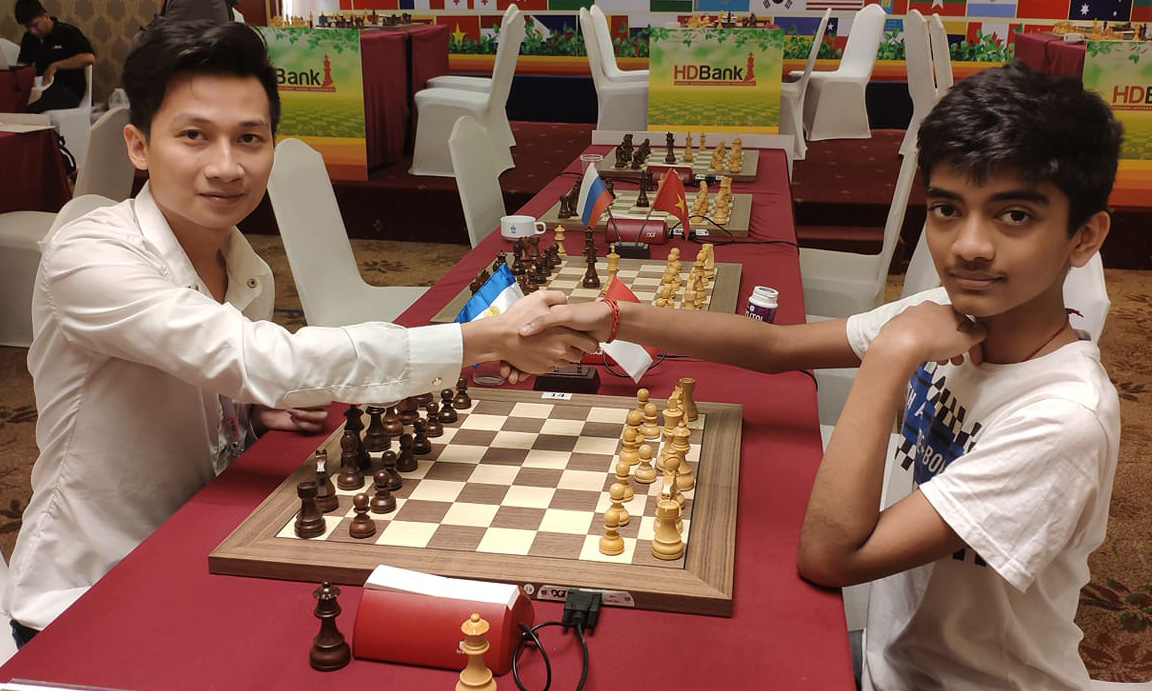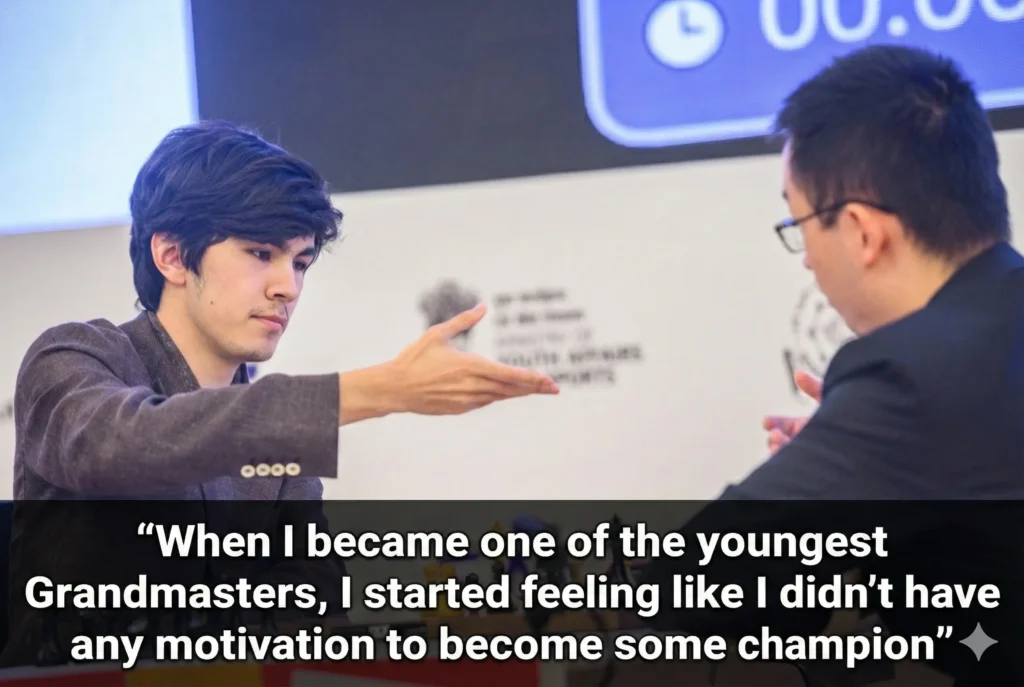In the high-stakes, silence-filled arena of the 2025 FIDE World Cup final, the pressure was enough to crack veterans twice his age. But when 19-year-old Javokhir Sindarov sat opposite China’s Wei Yi for the decisive rapid tiebreaks, his mind wasn’t on the $120,000 prize or the history books. He was thinking about a promise he made to himself three years ago—a promise born from a fear of irrelevance.
As the clock ticked down in the second rapid game, Wei Yi, the tournament’s undefeated juggernaut, finally faltered. With seconds remaining, the Chinese grandmaster snapped up a pawn, missing a lethal trap. Sindarov’s eyes, usually hidden behind a veil of stoic concentration, widened imperceptibly. His queen and rook sprang into a coordinated assault. On move 60, the handshake came.
At 19 years, 11 months, and 18 days old, Javokhir Sindarov had become the youngest World Cup champion in history, shattering a record held by Levon Aronian since 2005.
Yet, in the post-match press conference, the newly crowned champion wasn’t talking about destiny or innate genius. He was talking about laziness.
“In my opinion, if I didn’t work on myself, I never become [a] top chess player,” Sindarov said, the trophy sitting heavily on the table before him. “I’m the guy who don’t want to work a lot. But… I realized I need to work a lot, a lot, a lot.”
This victory, which secured his spot in the 2026 Candidates Tournament in Cyprus, was not the arrival of a new talent. It was the reinvention of an old one.
The Prodigy Who Stalled
To understand the magnitude of Sindarov’s victory in Goa, one must look back to his childhood in Tashkent. Sindarov was not just a good player; he was a statistical anomaly. In October 2018, he earned his Grandmaster title at 12 years, 10 months, and 8 days old—making him, at the time, the second-youngest GM in history.
He was a boy wonder, molded by his grandfather, who had coached him intensively from age four. But achieving the title brought an unexpected crisis of motivation.
When I became one of the youngest Grandmasters, I started feeling like I didn’t have any motivation to become some champion,” Sindarov confessed candidly to the press. “Because my grandfather always told me, ‘You need to become Grandmaster.’ Then he told me, ‘Okay, now I will take a rest. It’s your job.'”
With his mentor stepping back, the teenage Sindarov drifted. For nearly two years, he coasted on talent, spending time with friends and avoiding the grueling engine analysis required at the elite level. His rating stagnated in the 2500s.
Then came the wake-up call. It didn’t come from a coach, but from his peers. He watched as his contemporaries—India’s R. Praggnanandhaa, D. Gukesh, and Nihal Sarin—began to skyrocket past him, breaking the 2700 Elo barrier and challenging for world titles.
“I saw Indian players… growing up very fast. They became 2700 players,” Sindarov recalled. “I was thinking like, ‘Okay, if I don’t work on myself, I will never become a top chess player.'”
He found a new coach in Roman Vidonyak and fundamentally altered his lifestyle, trading leisure for 10-hour training days. That decision culminated in Goa, where Sindarov didn’t just outplay his opponents; he outworked them.
A Family Affair
In an era where top players travel with entourages of “super-seconds” and data analysts, Sindarov’s support system in India was conspicuously modest. There were no legendary formers champions in his corner. Instead, there was his brother, Islombek Sindarov—also a Grandmaster—and his grandparents, who arrived just in time for the final stages.
“We saw many players bringing very experienced seconds,” a reporter noted. “How did your collaboration happen?”
“I wanted to come here with my coach Roman,” Sindarov explained. “But he told me… ‘You can take your brother or your friend.’ I told [Islombek], ‘Are you free? Maybe we can go together?'”
The partnership proved vital. The brothers developed a strategy that defied conventional wisdom. While most players fight tooth-and-nail to win in the long, classical time controls, Sindarov and Islombek identified a different edge: speed.
Against Indian star Vidit Gujrathi, Sindarov explicitly played for a draw in the slow games, banking on his preparation in the frantic 5-minute blitz games.
“Today my plan was going to 5+3,” Sindarov admitted, revealing a gambler’s nerve. “I have some tricky lines in 5+3… my plan was play very solid in 10+10… and if some moment I will get some chance, of course I won’t realize it.”
The strategy worked. But the emotional toll was immense. Islombek described the exhaustion of the three-week marathon: “When we qualified to Candidates after the semi-finals, we came to the room and we feel that we are so tired emotionally and physically… But we know that we are not playing the final of World Cup every day.”
The Gauntlet to Glory
Sindarov’s path to the title was a minefield. The 206-player bracket included the world’s best, but Sindarov remained unbeaten in classical chess throughout the month. He dispatched heavyweights like Yu Yangyi and Frederik Svane with clinical precision.
However, he cited his Round 6 match against José Martínez Alcántara as the tournament’s psychological nadir. After losing the first game of the match—his confidence shattered by Martínez’s lightning-fast play—Sindarov nearly collapsed.
“I didn’t believe on myself because he never do mistakes,” Sindarov said. “I was thinking something like this. Second game when I won, I started like, ‘Okay, he’s also human.'”
That resilience carried him to the final against Wei Yi. The Chinese prodigy had been the tournament favorite, having not lost a game in 27 rounds. But in the tiebreaks, the “lazy” kid from Tashkent proved he had the deeper reserves of stamina.
When asked about his reaction to winning, Sindarov’s first thought wasn’t of glory, but of food. “I miss my plov,” he joked, referring to the traditional Uzbek rice dish. “Tomorrow I will go home and I will eat.”
The Rivalry Renewed
The victory does more than add a trophy to Sindarov’s cabinet; it sets the stage for a generational clash at the 2026 Candidates Tournament in Cyprus. Sindarov will join a field that includes Fabiano Caruana, Hikaru Nakamura, and, most notably, his childhood nemesis R. Praggnanandhaa.
The history between the two 19-year-olds runs deep, dating back to their days as children pushing pawns in youth championships.
“There is a lot of players [at the Candidates], but in my opinion… very interesting match against Prague,” Sindarov said, his competitive fire evident. “Because with Prague I played first time when I was like seven years old… he beat me. Also because of him I didn’t get any Cadets championship in 2013.”
It is a rivalry that defines the current era of chess—a shift away from the dominance of the Magnus Carlsen generation toward a new crop of hungry, hyper-prepared teenagers from Asia.
The New National Hero
In Uzbekistan, chess is rapidly becoming the national pastime. Following in the footsteps of 2004 World Champion Rustam Kasimdzhanov and 2021 World Rapid Champion Nodirbek Abdusattorov, Sindarov has etched his name into the country’s golden era.
“I told you that in 2004 [Kasimdzhanov] became World Cup champion,” Sindarov noted. “And after 20 years, again one of those guys takes this trophy.”
He revealed he had already received a call from the President of Uzbekistan just twenty minutes after the final move. “I think it will give a lot of motivation for young kids from Uzbekistan,” he said.
But unlike many champions who might take a month off to bask in the adulation, Sindarov has no such plans. The “lazy” days are strictly in the past. He plans to rest for only three or four days in Tashkent before flying immediately to South Africa for a Freestyle Chess tournament.
It’s only start of my chess career,” he insisted, dismissing the idea of a pool-jumping celebration à la Magnus Carlsen. “I don’t want to celebrate a lot… I need to be first to 2750 [rating]. Of course, my dream was to win these tournaments and play to World Champion.”
As the press conference wound down, Sindarov looked less like a teenager who had just won $120,000 and more like a craftsman already critiquing his next masterpiece. The wake-up call he received years ago hasn’t just kept him awake; it has made him relentless.
“Just work on yourself,” he told the crowd, offering advice to the young players in Nepal and beyond. “And of course, one day you will become a champion.”
For Javokhir Sindarov, that day is today. But listening to him speak, you get the distinct impression that he is already thinking about tomorrow.

I’m Xuan Binh, the founder of Attacking Chess, and the Deputy Head of Communications at the Vietnam Chess Federation (VCF). My chess.com and lichess rating is above 2300. Send me a challenge or message via Lichess. Follow me on Twitter (X) or Facebook.

